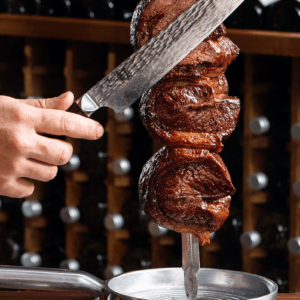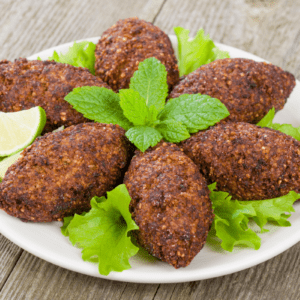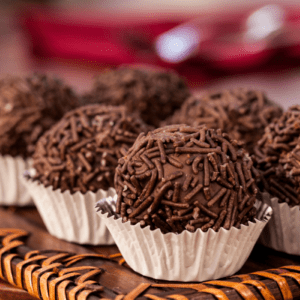Brazilian Culture Spotlight: the Baianas de Acarajé
Bahia is a state located in the northern region of Brazil. It is famous for its tropical coastline, colonial history, and rich Afro-Brazilian culture.
A ubiquitous figure of the markets of Bahia is the baiana. These women, clad in traditional head scarves and flowing white skirts, are the purveyors of a delicious style of fritter called acarajé. The dish has its roots in West Africa and was brought to Bahia in the 19th century. Today, there are over 500 acaraje vendors in Salvador, Bahia’s coastal capital city.
Table of Contents
What Is Acarajé and How Is It Made?
Acarajé is a stuffed fritter that is sold and eaten as a street food in Bahia. If you want to make a traditional acarajé take a look; a blend of black eyed peas, salt, pepper, and onions makes the dough. This mixture is molded into a round disc and deep fried in red palm oil. The disc is split open, stuffed with shrimp, and topped with vatapá or caruru. These are spicy pastes made with various ingredients like okra, ground cashews, and coconut milk. This dish is often served with a fresh salad.
Who Are the Baianas?
The Baianas are the descendents of slave women who sold their acarajés as a means of buying their own freedom or that of a family member. Later on, these women sold acarajé as a source of income. To this day, acarajes are prepared and sold exclusively by women who wear the traditional costume of their ancestors.
The Traditional Dress of Baianas
Baianas are easily recognized by their traditional style of dress, which is a blend of African and European styles. The signature look features a headdress or cap, which is a nod to the region’s Afro-Islamic heritage. A billowing white lace bodice and anáguas, or petticoat, are wrapped in five meters of saia cloth to form an ample skirt. Under the skirt is the camizo, a pair of cotton pants. The finishing touch is plenty of brightly colored jewelry: stacked bangles, drop earrings, rings, and layers of beaded necklaces.
The Baiana Religion
While the baianas can be seen sporting a variety of colors and patterns, many have maintained the traditional all-white costume. This is an homage to the deity of Obatala, a spirit of purity in the West African religion of Yoruba. In Bahia, Yoruba has been combined with aspects of Catholicism to become Condolé. Obatala has merged with Our Lord of Bonfim to become “Oxala,” and he acts as the Patron Saint of Bahia rather than a spirit.
In addition to being a favorite local snack, acarajé is also given as an offering to the Candomblé saints and gods during religious festivals.
Bainas de Acarajé are a National Treasure
The bainas and the acarajés they sell are an important symbol of Bahia’s African roots. The style of dress, ingredients in the dish, and ties to Candomblé are traditions that have been carefully maintained for many generations.
In 2004, the National Institute of Historic and Artistic Heritage (IPHAN) certified “acarajés as prepared by bainas” as a national treasure. Acknowledging not just the dish but the manner in which it is prepared underscores the value and impact of Bahia’s Afro-Brazilian culture.
Visit Texas de Brazil for Traditional Brazilian Dishes
Texas de Brazil prioritizes authenticity in all of our dishes. Our servers are trained in traditional gaucho style and hospitality, and each of our dishes is carefully researched and prepared. From a perfectly seared picanha to a savory moqueca stew, we aim to give our guests a true taste of Brazil. Visit one of our 50+ locations for your next dining out occasion.





